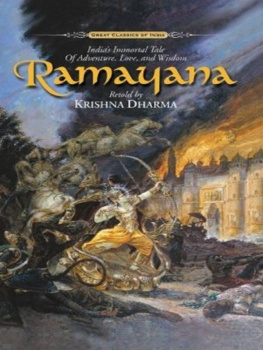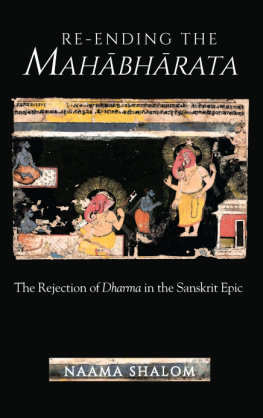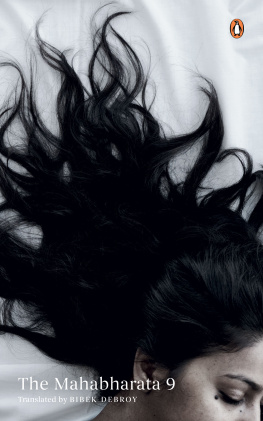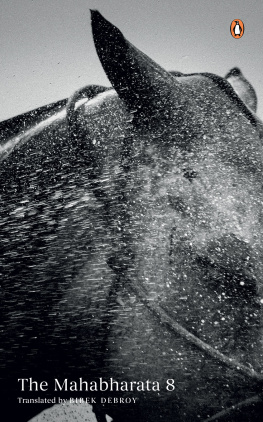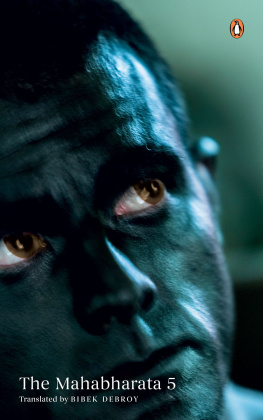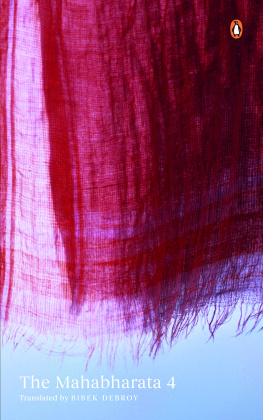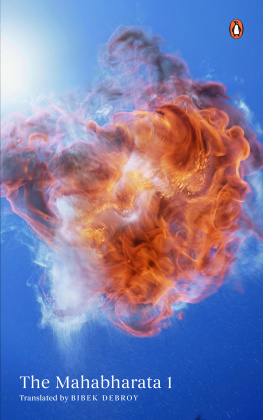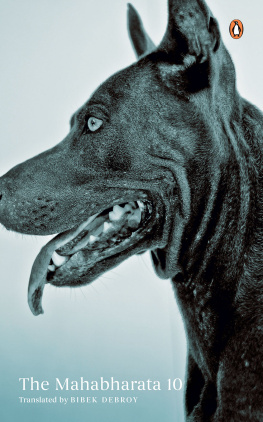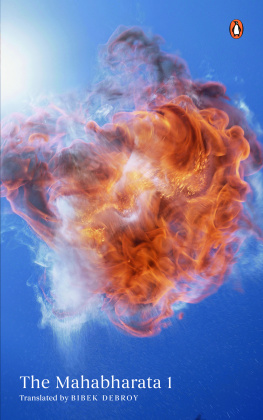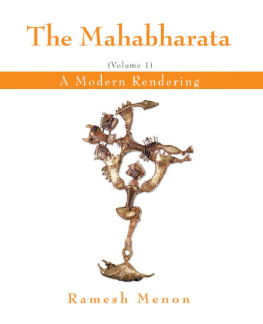Krishna Dharma - Mahabharata: [the greatest spiritual epic of all time]
Here you can read online Krishna Dharma - Mahabharata: [the greatest spiritual epic of all time] full text of the book (entire story) in english for free. Download pdf and epub, get meaning, cover and reviews about this ebook. City: New Delhi, year: 2009, publisher: Krishna Dharma;Om Books International, genre: Non-fiction. Description of the work, (preface) as well as reviews are available. Best literature library LitArk.com created for fans of good reading and offers a wide selection of genres:
Romance novel
Science fiction
Adventure
Detective
Science
History
Home and family
Prose
Art
Politics
Computer
Non-fiction
Religion
Business
Children
Humor
Choose a favorite category and find really read worthwhile books. Enjoy immersion in the world of imagination, feel the emotions of the characters or learn something new for yourself, make an fascinating discovery.
- Book:Mahabharata: [the greatest spiritual epic of all time]
- Author:
- Publisher:Krishna Dharma;Om Books International
- Genre:
- Year:2009
- City:New Delhi
- Rating:4 / 5
- Favourites:Add to favourites
- Your mark:
- 80
- 1
- 2
- 3
- 4
- 5
Mahabharata: [the greatest spiritual epic of all time]: summary, description and annotation
We offer to read an annotation, description, summary or preface (depends on what the author of the book "Mahabharata: [the greatest spiritual epic of all time]" wrote himself). If you haven't found the necessary information about the book — write in the comments, we will try to find it.
Mahabharata: [the greatest spiritual epic of all time] — read online for free the complete book (whole text) full work
Below is the text of the book, divided by pages. System saving the place of the last page read, allows you to conveniently read the book "Mahabharata: [the greatest spiritual epic of all time]" online for free, without having to search again every time where you left off. Put a bookmark, and you can go to the page where you finished reading at any time.
Font size:
Interval:
Bookmark:
Copyright 1997, 2014 by Krishna Dharma
a.k.a. Kenneth Anderson
The right of Krishna Dharma to be identified asauthor of this Work has been asserted by him in accordance with theCopyright, Designs and Patent Act 1988.
Smashwords Edition
All rights reserved.
No part of this publication may be reproduced, storedin a retrieval system or transmitted in any form or by any means,electronic, mechanical, photocopying, recording or otherwise,without prior permission of Krishna Dharma.
I expect that most people taking the time to read this introductionare newcomers to the text. For those already familiar with thestory, no introduction is needed. They will want to immediatelyenter the deep waters of Mahabharata ,waters that are at once soothing and stimulating to both heart andmind. If this is your first reading, however, although it is aclich, I have to say, "Welcome to the wonderful world of the Mahabharata ."
Welcome to a world where gods and heroes walkthe earth, where virtuous kings lead the people, where ourlifetimes are seen as simply one step along an eternal path leadingto worlds of unending bliss. Here is a story that will enthrall youand at the same time deliver profound lessons about every aspect oflife. It was first composed in Sanskrit some five thousand yearsago by Vyasadeva, a mystic residing in the Himalayas. Its centraltheme is the true story of the lives of five powerful rulers, thePandavas. Woven throughout the story are other tales. We meetsages, warrior kings, and a host of other colorful personalities.Among them is Krishna, a divine incarnation and, as you willdiscover, the pivotal character in the book. It is due to Krishna'spresence that the work is revered as a sacred text. It does, infact, contain the Bhagavad-gita, which Krishna spoke and which hasbecome a spiritual treatise still read daily by millions of people(as indeed is the Mahabharata itself).
My rendition is not an academic one, nor isit unabridged. Rather, I have written it in a dramatic style in anattempt to bring my readers into the action and to help themexperience the majestic mood of ancient Vedic times. In myexperience, even readers who strongly desire to read the Mahabharata find themselves unable to gothrough the lengthy texts of unabridged scholarly translations thatare available. I have therefore attempted to make the text asaccessible as possible to all kinds of readers, but withoutsacrificing any of the essential details of the story. I haveremained faithful to the translations to which I had access, and Ibelieve my book is as authentic a rendition as you are likely tofind.
I will not delay your reading further. I havewritten a note at the end giving more background information, andyou will also find glossaries and appendices delineating the Mahabharatas many characters. Now I willleave you to immerse yourself in the great ocean of theMahabharata. All I can add is that the book has captivated me withits sublime message, making my life richer and fuller. I pray thatit may give you as much pleasure as it has given me in my manyreadings.
dharme charthe cha kamecha
mokshe chabharatarshabha
yad ihasti tadanyatrayan
nehasti na tatkvachit
"In the realm of dharma,artha, kama , and moksha , (ethics,economic development, pleasure, and liberation), whatever is foundin this epic may be found elsewhere, but what is not found herewill be impossible to find anywhere else." Mahabharata , Adi Parva 56.33)
Krishna Dharma September, 1998 and December2005
Part One: The Die is Cast
Chapter One. Birth of the Kuru Elders
Ambika peered curiously into the mirror asher maidservants finished adorning her in preparation for thenuptial bed. She had lost none of her beauty despite months ofmourning. Her skin was flawless and as white as milk. Curlingjet-black hair framed her oval face and bow-like eyebrows archedover her black eyes, which resembled two lotus petals. No wonderVichitravirya had been so enamored of her, rarely leaving her side.While he was alive her maidservants had adorned her each evening,in case her lord had desired to approach her. As Ambika again puton her ornaments and fine dress her mind drifted sadly back to thedays with her husband. After having lain in that great hero'spowerful arms, how strange to now be preparing to meet anotherman!
Ambika balked at the prospect and grewincreasingly restless. She dismissed the maidservants as theyfussed around her. She needed to be alone to think. When herhusband had died so untimely she had wanted to ascend his funeralpyre and follow him to the heavens. She could not imagine livingwithout him. But Satyavati, the queen mother, had restrainedhershe still had a duty to perform. Despite the fact that theyhad enjoyed so much pleasure together, after seven years ofmarriage they had not produced a child. Without leaving an heir theking was guilty of neglecting a prime duty. How then would he beable to reach the higher regions?
Satyavati had convinced Ambika and herco-wife Ambalika to stay and fulfill their husband's duty andthereby secure the welfare of his soul. The scriptures allowed thatin times of emergency a man's elder brother could conceive childrenin his wife if he was unable. This was such an emergency. Ambikafelt more peaceful. Her union with Bhishma would not be a betrayalof the love she felt for her husband, but a service to him and tothe kingdom. She stopped her restless pacing and lay down on theivory bed in bashful anticipation. Bhishma was a powerful andrighteous man. Who better to sire the future king? She shouldensure that he felt completely honored by her.
There was a knock at the door. Ambika lookedup shyly. The door opened and a tall man entered. Ambika's bloodturned cold. This was not Bhishma. There in her bedchamber stood awizened, ugly and filthy ascetic. His matted locks hung about hisgaunt face and he stared at her with fierce eyes. His teeth wereonly slightly less black than his complexion. Around his waist wasa soiled loin cloth, his only garment. His hairy body was encrustedwith dirt. Without any delay he came toward her and sat by herside. She recoiled from the foul stench emanating from his body.Who was he? She knew of no brother-in-law other than Bhishma. Sheprayed to the gods that she might lose consciousness, for how couldshe endure this fearful man's touch? As he put his hands on herdress she closed her eyes, barely able to repress her urge toscream.
* * *
Satyavati blamed herself. If it had not beenfor her father's greed, Hastinapura would not be in such aprecarious situation now. Here sat the powerful Bhishma, son of thegoddess Ganga. There was no greater hero on earth. As the eldestson of the righteous King Shantanu, he was the natural heir toHastinapura's throne, but the kingdom's good fortune had beenthwarted by her foolish father on her behalf.
She could still vividly picture the fatefulevents. It had seemed like any other day. She was sitting by theriver's edge, waiting to ferry travelers across. Her father, leaderof the fishermen, had given her that duty so she would gain thereligious merits born of service to travelers. On this particularday the emperor of the world, the mighty Shantanu, had been huntingin the nearby forests and was seduced by the alluring fragrancethat emanated from her body. Having sought out the source of thatcelestial scent, he had become bewitched by her beauty. From hisgaze it was obvious he desired to marry her. Upon hearing that shewas still unmarried, he had hurried to her father's house to askfor her hand.
When she herself had arrived home, she sawShantanu leaving their humble hut in dismay. Her father hadstipulated that he could only marry her if he promised the throneto her son. But the emperor already had a qualified son inDevavrata, who he had already consecrated as the prince regent. Theking was not prepared, simply for his own pleasure, to wrong hisworthy and beloved son. Thus he left, struggling to contain hishearts aching desire.
Font size:
Interval:
Bookmark:
Similar books «Mahabharata: [the greatest spiritual epic of all time]»
Look at similar books to Mahabharata: [the greatest spiritual epic of all time]. We have selected literature similar in name and meaning in the hope of providing readers with more options to find new, interesting, not yet read works.
Discussion, reviews of the book Mahabharata: [the greatest spiritual epic of all time] and just readers' own opinions. Leave your comments, write what you think about the work, its meaning or the main characters. Specify what exactly you liked and what you didn't like, and why you think so.

![Krishna Dharma Mahabharata: [the greatest spiritual epic of all time]](/uploads/posts/book/213378/thumbs/krishna-dharma-mahabharata-the-greatest.jpg)
